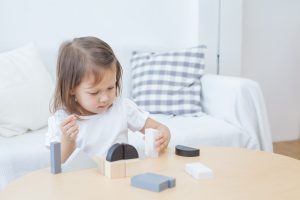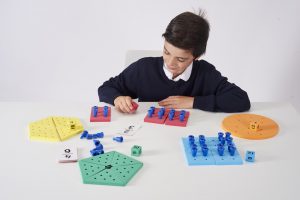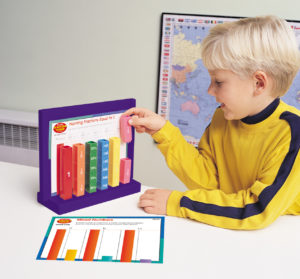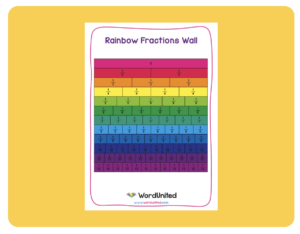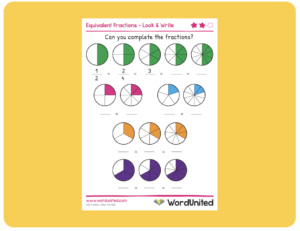No products in the cart.
Learning Fractions for Kids in 7 Easy Ways
September 21, 2019
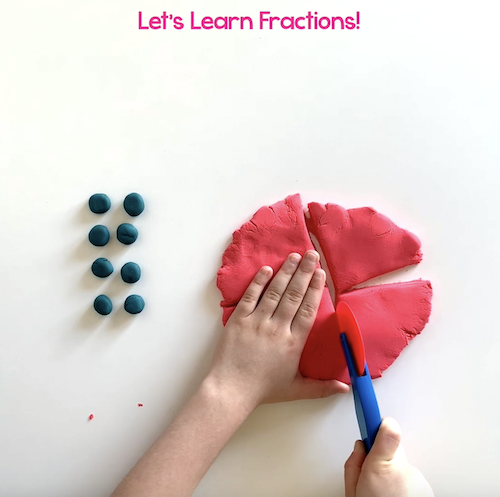
Learning fractions can be a tricky task! Watch our video above for fraction tips and read our 7 easy ways to learn about fractions below. We discuss free fractions worksheets, entertaining fraction games and ideas that improve children’s understanding of fractions. Even better, kids will have lots of fun with these educational activities.
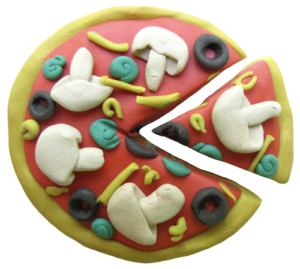
-
Learning Fractions for Kids with Play Dough
Start them young! Little ones can grasp early knowledge of fractions with enjoyable resources such as play dough. Create a circle with your play dough (let’s pretend this is a pizza or cookie – your child can choose). Kids can practice cutting the shape in half, ensuring the parts are equal, before attempting thirds, quarters and so on. Using play dough to visually represent the fractions is an excellent way for children to understand which fractions are bigger or smaller, as they see the actual size of the sections rather than trying to imagine it. Manipulating the dough can help children to improve their grip and strengthen their hand muscles, which will later be useful when learning to write.

-
Using Different Foods as Fraction Resources
Giving context to fractions is a wonderful way to make fractions seem more concrete and less abstract to children. You can point out to kids how fractions are all around us. Wondering about the best way to do this? Use food! Children can make their own pizzas and practice separating the toppings using fractions and slicing their pizzas. They can also bake a cake and consider the different quantities, such as ¼ tsp of salt or ½ cup of flour and how many pieces to cut the cake into. Food can also be beneficial when helping kids to understand the difference between numerators and denominators in fractions. Take an orange, for example. Oranges are split into segments – the total number of segments forms the denominator, the number at the bottom of the fraction. As children eat each piece of orange, they can begin to understand how the numerator – the number on top of the fraction – changes with each piece they eat.
-
Playing Fraction Games
Playing fraction games can be a fantastic way for children to learn without feeling like it is a chore. Little hands will love these chunky, eco fraction puzzles that improve colour recognition, numeracy and problem solving skills. Similarly, these fraction blocks are excellent for building with and learning early fraction concepts. For older kids, these colourful tiles improve understanding of equivalency, clearly representing how many different fractions make a whole one and displaying the various equivalent fractions. Magnetic foam fraction circles are another handy teaching resource that encourages children to visualise fractions.
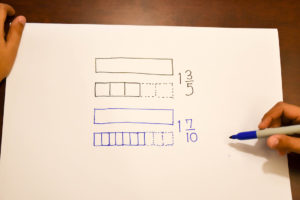
-
Teaching Fractions for Kids with Drawing
Although play dough pizzas, oranges and games are all intriguing ways to learn about fractions, they are not always readily available when you need them. Sometimes, a pen and piece of paper will do the trick. When children are working through fractions questions, drawing the question can help to visually represent the question. Try drawing chocolate bars or pizzas to represent the fractions in the question. Once your child has developed an understanding of fractions, drawing can also help them add and subtract fractions. For example, let’s imagine the question is 1/5 + 3/5. Children can draw a pizza and split it into 5 equal parts. Shade in 1 section in one colour and 3 sections in another colour, then work out how many sections are shaded in total. Children can notice how the denominator stays the same when adding or subtracting fractions, whilst the numerator changes.
-
Learning Fractions for Kids with Arrays
A brilliant way to work out difficult fraction questions is to create arrays. These can be created with counters or simply drawn onto a piece of paper and require children to think about numerators and denominators. If a question asked children to calculate ¼ of 12, they begin by drawing four groups, representing the denominator. Then, using 12 counters, work through each group, allocating the 12 counters equally. Finally, children count how many counters are in each group, in this case the answer would be 3. The numerator tells us how many groups we need to count. Cool math games like this hands-on fractions kit follow a similar concept. Children draw a fractions card and select an appropriate foam shape, then roll the dice to select a challenge. They must equally count out the pegs between parts of the shape to work out their answer.
-
Fractions, Decimals and Percentages
Figured out fractions? Now it’s time to learn their corresponding decimals and percentages. Fun teaching fractions videos from the BBC are engaging resources for children learning fractions. Though percentages only have 100 as their denominators, decimals can have any power of ten, such as 10, 100 and 1000. The ability to recognise equivalent fractions, decimals and percentages improves skills such as simplifying fractions. Try rainbow fraction towers to reinforce knowledge of equivalent fractions, decimals and percentages in a visually stimulating way.
-
Fraction Wall and Free Fractions Worksheets
If you are looking for a fraction wall and fun fractions worksheets, check out WordUnited’s Free Resources Hub. Here, you will find a growing number of fractions worksheets that you can download for free. For example, download our fraction wall and discover endless learning opportunities. Whether it is used as a fraction display, lesson support or game, kids will find a fraction wall helpful. Watch our fractions videoto see a great example of how to use a fraction wall. Alternatively, if you are teaching equivalent fractions, start with our Let’s Colour Equivalent Fractions worksheet, then download Look & Write Equivalent Fractions worksheet. To practice counting fractions on a number line, print this worksheet or try the adding fractions worksheets to improve addition skills. Have fun playing fractions dominoes with this free resource that you can laminate to use again and again.
Find more fraction resources on our Free Resources Hub WordUnited.com/resources



 01782 698558
01782 698558


